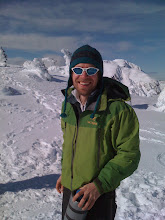I watched the oral arguments before the Alaska Supreme Court yesterday for Kanuk v Alaska, streamed live from Barrow. Four of the five justices made it (one was sick). A lawyer for the plaintiffs made their case for overturning the lower court's rejection, and a lawyer for the state explained why he thought the plaintiffs lacked standing.
The hearing was billed as educational -- the auditorium was half-filled with Barrow high school students -- and there was some feeling the court was hearing the case to encourage young people to get involved. But the case was also real, and serious, and if you believed the plaintiff's lawyer, in some ways similar to Massachusetts v EPA, in which the US Supreme Court ruled that Massachusetts and other plaintiffs did have standing, and which directed the EPA to regulate greenhouse gas emissions under the Clean Air Act (Alaska fought that one, too). If you were to
speculate based on judges' questions, you'd think there might even
be a possibility the Court would grant the sought-for declaration -- that the
atmosphere is a public trust subject to state protection -- even if it denied the sought-for injunctions, namely emissions reductions of
six percent per year through 2050 (apparently what Jim Hansen says is
needed to get back to 350 parts per million). The state's lawyer,
answering a question after, admitted that was his biggest concern.
According to APRN's coverage of the hearing, it was the first state Supreme Court hearing of such a case -- and a similar case won in a lower court in Texas.
The plaintiffs' lawyer, Brad DeNoble, argued the age-old public trust doctrine, as well as the state's constitution, required the state to protect the atmosphere. He argued the best available science should be used as a standard of sorts to determine the state's response. A few minutes in, Justice Winfree asked how one could prioritize the duties of the constitution (to utilize, develop, and conserve). Could not someone argue the state had failed to develop? he asked. I worried the hearing would be a mess of contrariness. I don't even remember how DeNoble responded -- I think he said that question was not before the court. But thinking now, I wonder if Winfree was on to something. If you can't develop and conserve at the same time (and many would argue you can't), which is the greater duty?
It was Chief Justice Fabe who asked about severability, twice, actually, going back and forth with DeNoble on how the Court could offer a declaration if it found the relief (the emissions reductions) beyond their reasonable determination. DeNoble was vague, but said there were other kinds of relief they could offer.
The state's lawyer, Seth Beausang, argued the case did not belong before the courts at all because the plaintiffs lacked standing, the state was not responsible for the global problem, and redress was impossible because Alaska could not significantly affect the global concentration of GHGs.
Justice Maassen noted that Nelson Kanuk had lost his house from erosion from thawing permafrost. How is that not an injury deserving of standing? Justice Bolger noted that bark beetles had killed the spruce trees in Katherine's yard. Isn't that harm?
Beausang said the plaintiffs' own argument, that climate change could make the world uninhabitable (I doubt they asserted quite that), meant that their harm as individuals would be no different than the harm felt by all.
So who would have standing? asked Maassen.
"I don't think anyone does, your honor."
Beausang argued the issue legally and practically should be one for the other two branches of government. DeNoble argued they were there because the Legislature had failed to meet its constitutional duties. ("Punted" is the word he used after the justices left.) Thankfully, the
court did not attempt to debate the science of climate change, which all
parties agreed was beyond their ability.
You can watch the hearing here.
Maybe he was just playing to the audience, but Beausang came across as almost sympathetic, as if constrained by a pro-development administration. He wasn't arguing nothing could be done about climate change, he told the audience after, just that it shouldn't happen in the courts. "You should get as involved as you possibly can to try to convince the political branch (branches?) to take action."
There weren't many signs of passion from the crowd; two students asked what the plaintiffs planned to do with the money (they are not seeking money). But Katherine and Nelson were impressive. Nelson, who is a freshman at UAF, spoke calmly and well, telling an audience not much his junior that he was trying to help them and their children and grandchildren. (He's already gotten a fair bit of media, including this story from NPR.) Katherine Dolma, a senior at Homer High School, said she hoped the case would be "the change that starts a huge movement."
Julie Olson, who runs a group called Our Children's Trust, said they had connected the students in Alaska (there are six plaintiffs in all) with lawyers two years ago, and are helping with similar youth-led lawsuits in other states. She said the students here got involved because they wanted to do more than write letters and march.
Subscribe to:
Post Comments (Atom)

No comments:
Post a Comment